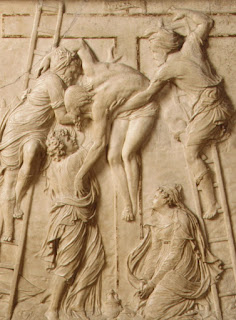We have now opened the Sacred Triduum of our Lord’s Passion, Death, and Resurrection; the most solemn days of our liturgical calendar. And how do we open these most solemn days? We began this liturgy by chanting the words of St. Paul to the Galatians: “We should glory in the Cross of our Lord Jesus Christ.” “We should glory in the Cross.” Powerful words, to say the least! And yet, how is it that something as brutal as a Cross has become the centerpiece of our faith? And we shouldn’t evade the horrendous brutality of the crucifixion.
In the Roman empire, crucifixion was a form of punishment exquisitely calibrated to inflict suffering on different levels. It involved not only agonizing physical pain, but it also maximized exposure and humiliation; it insured maximum vulnerability to the disdain, disregard, and derision of passersby. After all, no one would want to risk being associated with someone in this position - it was just too dangerous, it would have ensured complete social ostracism.
To me, this is why Paul’s words which we sang in our entrance chant, are so shocking. Because when Paul speaks of Christ crucified he is not just describing the manner of Jesus’ death. He is evoking the shame of it; the utter desolation of dying outside the city limits, outside the law, rejected, abandoned and despised by just about everyone. And yet, bizarrely, almost unbelievably, this is what Paul proclaims. Jesus Christ, afflicted, crucified, accursed, is ‘the power of God and the wisdom of God.’ Such words strain the very borders of what makes sense, humanly speaking. So why does he say this? And why do we so solemnly proclaim it?
To proclaim Christ crucified, as Paul does and as we do with him is to say that this place of affliction, of shame and dereliction, has been entered into and undergone by God. The worst that can befall us, the suffering most threatened by sheer meaninglessness - right here, Paul says, Jesus Christ has come and known it from the inside. Known it and broken its power over us. How? By revealing that even this place of utter degradation cannot separate us from the love and life of God.
Christ redeemed us by becoming accursed. Christ redeemed us by going to the place where everyone was sure God was not. The love of God is a love that goes where God is not supposed to be; where God cannot even be imagined or conceived to be. [he became sin] God’s love in Jesus Christ becomes recognizable precisely as that love which goes where it has no business going; the place of the curse; the place where God is forgotten.
My brothers and sisters, on this evening over 2000 yrs ago, Jesus gathered with his close circle of friends to celebrate a final, farewell meal together. Jesus pretty much knew what was in store for him by this time. He had heard the whispered accusations of blasphemy and felt the growing antagonism of the religious leaders. And he knew that blasphemy was grounds for the death penalty. And since Jewish law wouldn’t allow the religious leaders to put him to death, he’d have to be handed over to the Roman authorities. And he knew well that crucifixion was their preferred mode of execution. He knew what awaited him. And so he also knew what awaited his friends and disciples. He knew the fear, disappointment, disillusionment and distress that was going to be theirs over the next few days. And he passionately wanted to offer them something. Passionately! As Luke’s Gospel puts it: “When the hour arrived, he took his place at table and the apostles with him. He said to them: ‘I have greatly desired to eat this Passover with you…” What he so passionately wanted to offer to them was more than just words of advice or consolation or encouragement. That was part of it. But He knew that wouldn’t be enough. He wanted to offer them, and us, himself - whole and entire. Take eat, this is my body. "Take drink, this is my blood." Nothing less would satisfy his fervent desire. Think of this when you come up for communion this evening. When you proclaim ‘Amen’ to the body and blood of Christ, not only are you satisfying your own hunger and desire for God; but you are also allowing God’s fervent desire and hunger for you to be satisfied.
Excerpts from Abbot Damian's Homily for the Evening Mass of the Lord's Supper.




























